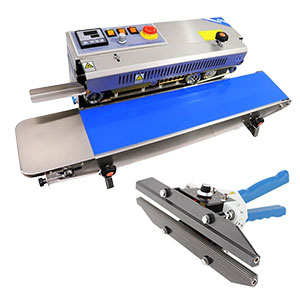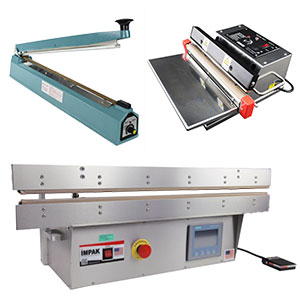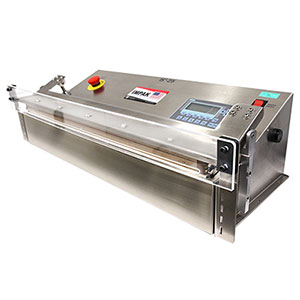
How to Choose a Heat Sealer
Heat sealers for flexible packaging generally all work in the same way. The unit delivers power to one or two heating elements which become hot enough to melt plastic. When these elements are applied to a plastic pouch, the heat causes the two sides of the material to fuse together and create a seal that should largely prevent the flow of air or moisture into or out of the pouch.
Beyond this basic functionality, there are several differences in how heat sealers have been designed that can affect which kind you will want for your application. Some of these differences include whether the unit delivers heat to its elements on a constant or impulse basis, how much control is offered over the temperature of the elements, and whether the unit allows you to seal a pouch in a horizontal, vertical, or other kind of orientation.
The Basic Types of Heat Sealers

Constant Heat Sealers
The oldest heat sealing technology is the constant heat sealer. The early models of these machines featured “hot bars” that were set to a specific temperature and clamped together at the opening of a thermoplastic pouch to create a seal. Because the heating elements stay very hot, these units use more energy than other types of sealers and must be used with a degree of caution. Constant heat units continue to be produced, as they are a preferred choice to seal some thick or multi-layer materials.
A variation on the constant heat principle that has become very popular is the continuous band sealer. These units have a conveyor belt that moves pouches along such that their openings pass through enclosed heating and cooling elements that create a seal. Band sealers allow an operator to feed bags through the sealing process in rapid succession (which is why IMPAK refers to its band sealers as RapidSealers™). These units can be built to pull vacuum, do gas flushing, and to print or emboss information on the seal area.
Browse IMPAK's constant heat sealers:

Impulse Heat Sealers
With the desire to make sealers more efficient and less dangerous, impulse sealers were created. These machines deliver power to their heating elements only when the seal jaws are closed, quickly heating up and cooling down each time a bag is sealed. Most impulse sealers are time-based rather than temperature-based sealers. Instead of allowing the operator to set a temperature, impulse sealers offer modest control of how much power is delivered to the heating element(s) and the length of time heat is applied.
Impulse sealers have become the most popular type of pouch sealer available. There are many simple, economical units available, most of which are designed to be manually operated. There are also units that feature automated mechanical sealing and pneumatic sealers that are operated via foot pedal. Many impulse units are fitted with vacuum sealing and/or gas flush capabilities, as well as a wide array of other features.
Browse IMPAK's impulse sealers:

Intelligent Sealers
The most advanced versions of impulse sealers to date are those that allow precise control of temperature, time, and even seal pressure. At IMPAK, we refer to these as iS2 Sealers, featuring our Siemens-based intelligent sealing system. The digital iS2 system was developed to answer the need for process validation for pouch sealers used in medical applications, for which rigid sets of protocols must be followed to meet FDA guidelines and guarantee sterility.
IMPAK’s iS2 units provide temperature accuracy of ±1 degrees Fahrenheit, with the system taking temperature readings every 1-2 milliseconds. Seal time can be adjusted in 1/10 second increments, and pressure with 0.1 PSI consistency, both controlled directly from the HMI. These units also allow operators to save up to 500 “recipes” (precise formulas for temperature, time, and pressure) for easy and consistent reuse and reliable seals.
Browse IMPAK's intelligent sealers:
If you have further questions about which kind of heat sealer will work best for your application, contact us and our knowledgeable staff will help you find the right fit. Since we also specialize in laminated flexible packaging, we can advise on what types of sealers work best with specific material structures.
